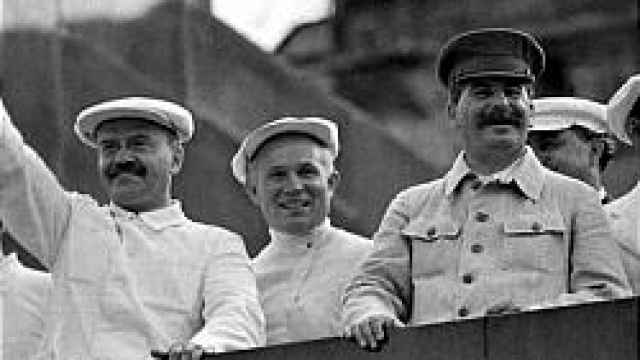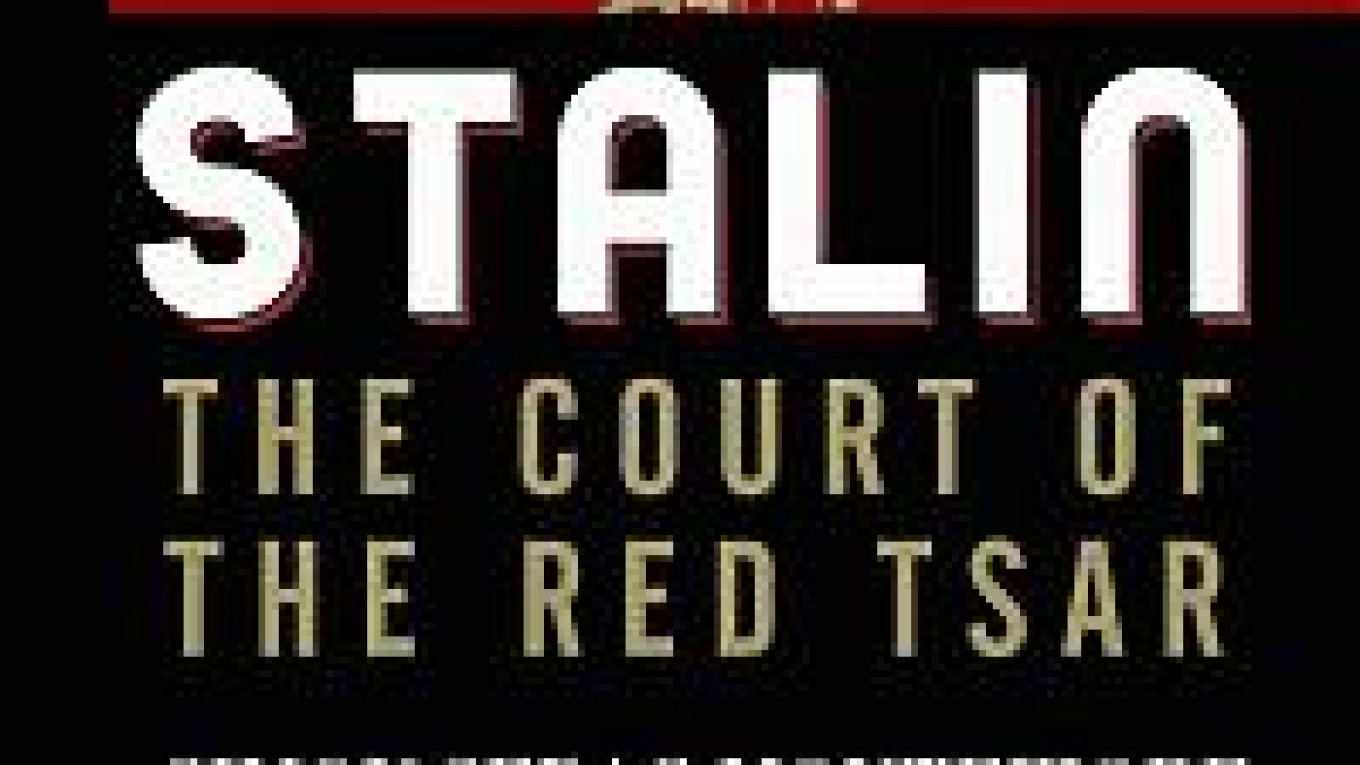This story -- authentic, as are so many others scattered through this huge volume -- encapsulates at one and the same time Stalin's keen eye for historical parallels and stout familial feelings. Good son? Warm-hearted father? Jolly uncle? Above-average lover? Yes, as attested to in the memoirs of his daughter Svetlana, composed after she defected to the United States, and the testimonies and evidence of his other two children, not to mention nephews, cousins, uncles, young ballerinas and friends' wives borrowed for a night or two (six of whom were arrested in the course of time and some of whom were killed as "enemies of the people"). Amassed by the indefatigable Simon Sebag Montefiore from archives inaccessible to the public until recently, and from personal conversations with surviving witnesses, the accounts exude unmistakable authenticity.
The fact that wildly contradictory feelings can coexist within a person, that a monster like Stalin -- and Stalin was surely one of history's unmistakable monsters -- can also demonstrate kindness and human warmth, has been proven so often that it no longer comes as a surprise. What distinguished Stalin was his extremism, as characteristic of his grief as of his other emotions. When, on Nov. 8, l932, during an all-night Kremlin party, his mercurial behavior and the increasingly savage politics of his court drove his youthful wife, Nadya Alliluyeva, to commit suicide, Stalin went off the rails. Weeping uncontrollably, he told two of his (then) close friends that Alliluyeva's death had "crippled" him, perhaps forever.
 Itar-Tass From left to right, Vyacheslav Molotov, Nikita Khrushchev and Josef Stalin on Red Square. | |
So was his extraordinary ability to shift from one extreme to the other, to reverse his attitude from, say, friendship and support to malignant contempt without indicating the slightest awareness of having done so. The fact that Comrade X had at one time been admired and fulsomely praised did not matter one whit. An enemy was an enemy, whatever his past record might be (though careful examination of that record often revealed early evidence of "deviant" behavior). Furthermore, the dialectical materialism embraced by the Bolsheviks dictated that there could be no half-enemies, any more than half-friends. And so Comrade X was doomed, though execution or deportation to the Gulag might still be protracted into stages that offered him (once a fine comrade!) the opportunity to squirm and debase himself in grimly comical fashion.
It is curious that, although Stalin's cohorts -- and Montefiore's book is as much a history of Stalin's close comrades-in-arms and their wives and children as of the dictator himself -- knew that even the most minor infraction could lead to a bullet in the back of the head, they were nonetheless stunned when Stalin's wrath turned against them. Having followed their vozhd, or leader, through all the twists and turns of policy from the l920s on, they saw their own ranks grow thinner as mass collectivization, industrialization and terror took their toll. But when their own hour struck, they went ballistic.
This is understandable, for who can bear the sudden loss of one's one-time friend, especially if that loss leads to murder? Still, there was more behind their reaction than disappointment. The explanation lies in the complex nature of the relationship between Stalin and his entourage. As time went on, suspicion and fear of the vozhd intensified, and hostile factions seeking Stalin's replacement developed within the leadership.
To be sure, these had nothing to do with the phantasmagorical "conspiracies" with which many of them were eventually charged in the notorious show trials and the hundreds of smaller tribunals that decimated a huge chunk of the communist elite in the mid-l930s. But those who had never dreamed of opposing Stalin were horrified by the accusations. Their attitude toward the vozhd was not just zealous loyalty and admiration, but frequently love, almost in the erotic sense of the term. Montefiore illustrates this with numerous examples, often drawn from letters pleading for mercy and understanding. The letters bespeak not only dread and despondency, but unrequited love. For hell knew no greater fury than Stalin's scorn (or indifference, which amounted to one and the same thing). Here, for instance, is an excerpt from the frenzied reaction of Lev Mekhlis, to being demoted from secret police chief to editor of the newspaper Pravda:
Dear Comrade Stalin,
My nerves did not stand up. I did not comport myself as a Bolshevik; especially I feel the pain of my words in our "personal talk" when I personally owed my whole life and my partiinost [commitment to the party] to you ... I can't be chief of Pravda when I am sick and sleepless, incapable of following what is happening in our country ... I had to tell you this personally but it was foolish to lie. Forgive me, my dear Comrade Stalin, for that unpleasant minute I gave you. It's very hard for me to go through such a trauma.
Even more revealing, perhaps, was the attitude of Nikolai Bukharin, champion of the moderate economic line introduced in the early l920s, the New Economic Policy, who tried to defend himself as best as he could against the obscene charges of "treason" hurled at him by Stalin and his (then) allies. At the l7th Party Congress in January l934 (out of whose 1,966 delegates 1,108 were arrested during the following four years), Bukharin called Stalin "the glorious field marshal of the proletarian forces, the best of the best." And in l938, before his execution, he wrote a pathetic note that showed that he still did not understand Stalin's modus operandi. "Koba," read the note, addressing Stalin by nickname. "Why do you need me to die?"
Sebag Montefiore, a British journalist whose previous writings include a biography of Potyomkin, and whose narrative follows Stalin et al. right through the dictator's death in l953 -- each chapter a treasure of fascinating details -- shows compellingly that, while Stalin was the undisputed leader of the pack, his cronies lied, betrayed and killed as adroitly as he. In l938, for instance, Nikita Khrushchev, whose role in Stalin's dethronement in l956 is so widely (and not without reason) admired, signed the death list of 106,119 people in his fiefdom, Ukraine. Neither their names nor their "crimes" were adumbrated: Simply, this was the "quota." Indeed, without the "contributions" of the Molotovs, Kaganovichs, Voroshilovs, Mikoyans and Khrushchevs, the whole grisly history could not have been written.
Abraham Brumberg, who has written widely on Russian and East European affairs, is finishing his autobiography, "Journeys Through Vanishing Worlds."
A Message from The Moscow Times:
Dear readers,
We are facing unprecedented challenges. Russia's Prosecutor General's Office has designated The Moscow Times as an "undesirable" organization, criminalizing our work and putting our staff at risk of prosecution. This follows our earlier unjust labeling as a "foreign agent."
These actions are direct attempts to silence independent journalism in Russia. The authorities claim our work "discredits the decisions of the Russian leadership." We see things differently: we strive to provide accurate, unbiased reporting on Russia.
We, the journalists of The Moscow Times, refuse to be silenced. But to continue our work, we need your help.
Your support, no matter how small, makes a world of difference. If you can, please support us monthly starting from just $2. It's quick to set up, and every contribution makes a significant impact.
By supporting The Moscow Times, you're defending open, independent journalism in the face of repression. Thank you for standing with us.
Remind me later.


